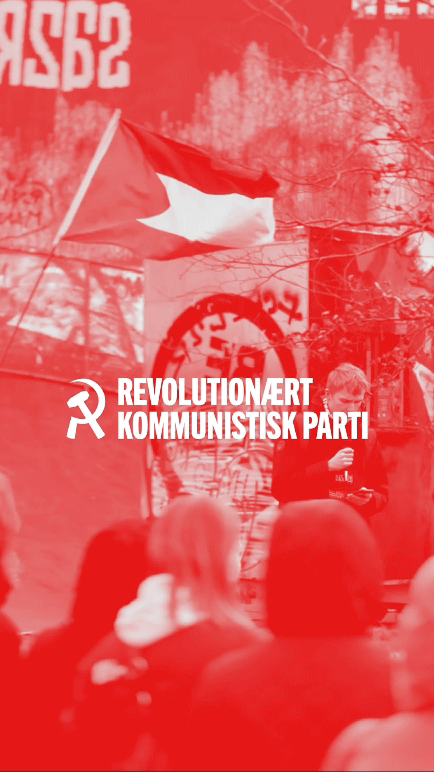[REVOLT is Revolutionære Socialister’s English magazine. This article was published in REVOLT No. 2, oct. 2016.]
Editorial: On the 23rd June Britain voted to leave the EU sending shock waves throughout Europe. It was yet another notch up in the centrifugal forces that are pulling the European Union apart under the pressure of the organic crisis of capitalism. Questions regarding nationalism versus internationalism, democracy and so on are becoming increasingly acute. It is a discussion which has once again flared up in the Danish Left following brexit. It is also a debate which has, until recently, been characterized by a total absence of socialist class perspective.
Enhedslisten and brexit
Enhedslisten celebrated brexit as a victory for democracy and the working class. Pernille Skipper stated the following on Enhedslisten’s homepage:
“The British exit is good for the British worker who will now have better chances of combating underpayment and poverty. It draws the political influence back to the British population and away from an undemocratic EU-system. And that is a victory.”
And continues: ”We believe that the possibility to demand more rather than less democracy is one that the Danish population should also have. Today, the EU prevents Denmark from banning dangerous chemicals in children’s toys, prevents us from effectively putting an end to social dumping and calls for cuts on welfare throughout the entire Europe. And that happens at the expense of the European people.” Enhedslisten end the statement with a call for a referendum set latest on Constitution Day 2017.
Let us take a closer look at these claims one by one.
Claim 1: Brexit is good for the workers
Claim one: That brexit is positive for the British workers and it gives them better opportunities to combat underpayment and poverty. This is reflective of the naive idea that wages and working conditions are primarily questions of political will regardless of time and place. It fosters the utopian idea that a country can isolate itself from the rest of the world. The truth is that in capitalism all countries are part of the world market and subject to international competition. There is a constant downward pressure on wages and working conditions regardless of whether one is in the EU or not. The competition is international.
Each individual country’s capitalists are doing what they can to pressure the working class in order to increase their own profits and survive in the competition. The EU has indeed been a political tool for the European bourgeoisie in this respect. EU legislation has been a clever excuse. However, EU policy has also expressed the nationalist capitalists’ interests.
The brexit-side of the British bourgeoisie didn’t exactly argue for brexit as a possible measure to pursue a more progressive policy, as presented by Pernille Skipper. On the contrary, they believed brexit would give them better opportunities to further crush the rights of the British workers.
Brexit was followed by sharp drops in the stock markets and the British pound. The British economy will be hard-hit by brexit. Similarly, brexit is yet another factor in further destabilizing the world economy. Britain’s position as an industrial power has been undermined throughout the last 100 years, and the British economy is dependent on trade, particularly trade with other European countries. This is what underlies the harsh attacks on the conditions of the British working class, which particularly took off under Thatcher. Brexit will not mean better conditions for the British workers but will rather play a role in speeding up the already implemented austerity policies.
Brexit was a serious blow to the interests of the Danish bourgeoisie. When Denmark entered the EC in 1973, it did so alongside Britain, who has since been an important ally particularly in promoting free trade, as a counterweight to several of the southern European countries. Danish economy is small, open and entirely dependent on export, and is possibly even more dependent on the EU than Britain is. When Denmark had just entered into the EC in 1974, export amounted to 31 percent of the country’s GDP. By 2014 it had risen to 53 percent. Around 60 percent of Denmark’s exports go to EU countries, of which 7 percent go to Britain; Denmark’s fifth largest trading partner. Danish economy will not improve with a withdrawal from the EU.
Enhedslisten’s main depiction of brexit is one that gives illusions of an EU-exit being the way forward to the return of the golden age of the welfare state. Historically, however, the economic foundation of the welfare state was built upon the strong and long-lasting post-war boom. This phenomenon was a historical exception of capitalism and is impossible to return to. Capitalism today finds itself at a dead end. The general tendency is down. This means that the only future capitalism offers is austerity. This is what lies as the root cause of the constant austerity – not EU membership.
Claim 2: brexit is a victory
Claim two: brexit is a victory. Firstly, one must ask: a victory for whom? With a little effort one might understand Enhedslisten’s statement as concluding that brexit was a blow to the European capitalists and similarly that a Danish withdrawal from the EU would be a blow to the Danish capitalists. However, just because something may be unfavourable to the capitalists does not necessarily mean that it is beneficial to the workers. When the economy is in a slump it is not the bourgeoisie who pay the price. It is the working class. This does not reversely mean that the brexit camp can incur the blame for the crisis in the British and European economies. Capitalism is in an organic crisis and the ruling classes have proven unable to solve it. It is precisely this crisis which is reflected in the disintegration tendencies of all known institutions, including the EU. Socialists take no responsibility for the crisis of capitalism whether within or without the EU.
Nothing about brexit makes it a victory for the British workers. Was it a victory for the British Left? Within Labours’ right wing, brexit became the pretext to launch a coup against the Labour leader, Jeremy Corbyn, who was elected with an overwhelming majority last year. Currently this coup seems to have been defeated by the active mobilization of Labours members.
In the broader context, brexit certainly did not strengthen the left-wing forces in the UK either. The brexit camp was not progressive nor was it very influenced by the Left; it was dominated by the nationalist, populist right-wing. It was led by right-winged, racist and liberal UKIP and Conservative politicians, such as Boris Johnson, who has now been appointed foreign secretary. It is this section of the British bourgeoisie which has been strengthened by brexit. The brexit camp argued that the problems of the British workers were caused by the EU and immigration, not capitalism. Since brexit there has been a distinct rise in racism and hate crimes, directed against both Muslims and other European nationalities such as Poles and Spaniards. It is not exactly a march forward for the Left.
Claim 3: brexit strengthens democracy
Claim three: brexit is better for democracy. The EU is undoubtedly a thoroughly undemocratic institution. The problem is that in their critique of the EU and in their lack of a socialist alternative, Enhedslisten ultimately (consciously or unconsciously) end up putting forward a nationalistic defence of the bourgeois nation state. The fact that Enhedslisten propose that a referendum take place on Constitution Day speaks for itself.
In Denmark the Left has traditionally always stood stronger in the anti-EU camp than it has in Britain. However, it has increasingly become the nationalistic/right-winged populist side that has begun to dominate the no-camp in Denmark also. The Left has unfortunately contributed to this development. This was expressed in its support for the class collaborative movement ‘People’s Movement against the EU’. In doing so, the Danish Left completely submitted to the few right-wing forces in the movement and thereby renounced the possibility of putting forward a socialist alternative to the EU, in order to ensure a broad, ‘nonpartisan’ EU resistance. In reality the overwhelming majority of the People’s Movement against the EU are socialists. But policy cannot be socialist.
When, at Enhedslisten’s last conference, the majority voted for a break with the People’s Movement against the EU, it was precisely with the argument that there was a need to put forward a socialist EU policy. The argument was correct; but predictably the entirely opposite happened in practice.
At the Danish European Union opt-out referendum in December, Enhedslisten went into an alliance with the Danish People’s Party and The Liberal Alliance. Enhedslisten’s top officials argued for the justifiability of this alliance because it ultimately secured a ‘NO’. But what was a ‘no’ worth when it failed to raise the consciousness of the working class? On the contrary, Enhedslisten set the Danish constitution and the ‘constitutional state’ as the alternative to the EU’s undemocratic structure. And this was during a time when the Danish parliament was about to adopt some of the most undemocratic and inhumane asylum laws in the advanced capitalist countries.
The Danish nation state is a tool to defend the power and privileges of the ruling class and as revolutionary socialists we fight, in Marx’s words, to ‘smash’ it. The EU was formed because the European capitalist classes were too weak in their small nation states to stand against, on the one hand, the United States and Japan, and on the other hand against the growing working class. The nation state has become a fetter on the development of capitalism and the EU is a symptom of this.
A socialist alternative
Now we finally get to the other side of the post-brexit debate. It is the side which has criticised Enhedslisten’s nationalism. The problem is that while its critique of Enhedslisten’s nationalism is entirely correct, none of the critiques include a class perspective. There is no international socialist alternative to be found. If indeed there is an alternative put forward, it seeks to work to transform the EU from within in order to take it into a more social and green direction. Good luck is all we can say.
In our eyes this is just as naive as Enhedslisten’s approach. In a clash with the nation state, the EU will not be the answer for the working class. The EU is even more bureaucratically structured than the nation state, and is to an even higher degree able to withstand pressure from the working class. The EU is nothing more than a tool for European capital in the defence of private ownership of the means of production. The EU’s anti-social and anti-democratic character was all too clearly demonstrated in Greece last summer. Here we saw the EU force its policy in direct violation of democratic elections and referendums, against a country’s population. If a left-winged government were to come to power in Britain, Denmark or any other European country, it would immediately become subject to the market and the dictations of the EU.
Whether it is better to be inside or outside the EU is not a question that makes sense to ask for the working class. The working class struggle is not simply a fight against the EU but also against the nation state and the national bourgeoisie. The struggle of the working class is for an international upheaval; for the United Socialist States of Europe within a socialist world.
[Join our international branch in Copenhagen! Write to marxist@marxist.dk]






